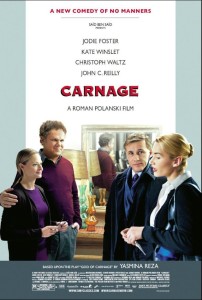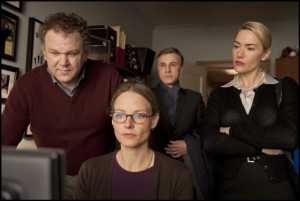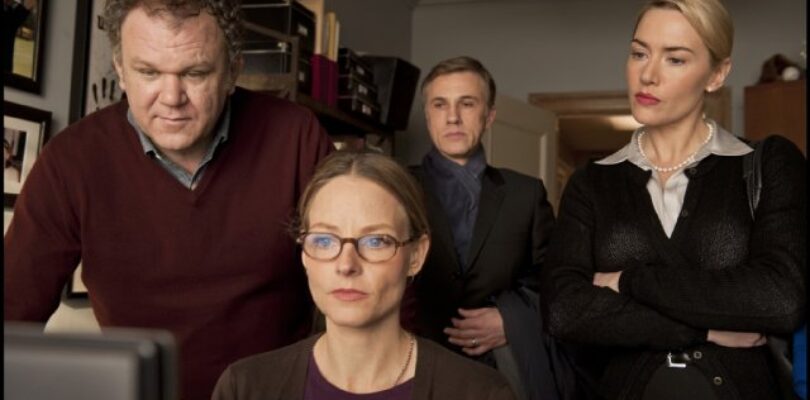
| Release Date: | December 16th, 2011 in limited release |
| Starring: | Jodie Foster, Kate Winslet, Christoph Waltz, John C. Reilly |
| Writer: | Yasmina Reza, Roman Polanski |
| MPAA Rating: | R |
| Director: | Roman Polanski |
With sadistic glee and a voyeur’s camera, Roman Polanski’s film version of French playwright Yasmina Reza’s stage production God of Carnage (shortened to the misleading horror-suggesting title Carnage)is a razor-sharp, viciously mocking comedy of bourgeois manners that draws from the caustic work of Edward Albee and the brittle futility of Luis Bunuel’s best efforts (especially as a variation on his The Exterminating Angel).
 Two boys have had a scrap on the playground, leaving one of them missing two teeth after being struck by the large stick in the other kid’s hand. On stage, we do not see this, but Polanski chooses to open the film with a wide shot of the incident to hammer home the common brutality of children as a counterpoint to the more nuanced psychological brutality of the adults meeting to discuss the repercussions. The next hour and eighteen minutes take place entirely in the apartment of the injured child’s parents as ideological differences, minor etiquette infractions, profuse vomiting, and veil-dropping honesty keep the two couples at one another’s throats with little opportunity for escape.
Two boys have had a scrap on the playground, leaving one of them missing two teeth after being struck by the large stick in the other kid’s hand. On stage, we do not see this, but Polanski chooses to open the film with a wide shot of the incident to hammer home the common brutality of children as a counterpoint to the more nuanced psychological brutality of the adults meeting to discuss the repercussions. The next hour and eighteen minutes take place entirely in the apartment of the injured child’s parents as ideological differences, minor etiquette infractions, profuse vomiting, and veil-dropping honesty keep the two couples at one another’s throats with little opportunity for escape.
Bravo to the casting director who made the brilliant intuitive choices of the four principle actors. John C. Reilly and Jodie Foster are the bookish, liberal Michael and Penelope Longstreet: polite to a fault, resilient in their altruistic belief system (Penelope is writing a book on the Darfur massacres while Michael is pathologically ingratiating). With his man-boyish demeanor and burly physical presence, Reilly is ideal in the seemingly benign role of the thankless workingman enduring his wife’s stringent, WASP-ish tendency to engage in academic debates rather than frank talk. As the film progresses, a more callous side of Michael emerges and finds Reilly cantankerous but still troublingly loveable. Foster’s Penelope is the primary catalyst who cannot leave well enough alone; feeling that the other couple is not properly contrite and too ready to write off their own son as a violent bad seed, she nudges the arguments along with a professorial haughtiness in a fundamental “nature vs. nurture” stalemate.

John C. Reilly (from left), Jodie Foster, Christoph Waltz, and Kate Winslet in “Carnage.” © 2011 – Sony Pictures Classics.
The Longstreet’s worthy combatants are Nancy and Alan Cowan played with vaguely European “otherness” by Kate Winslet and Cristoph Waltz – he is a lawyer constantly glued to his phone, doing damage control for an impending class action suit against a pharmaceutical company (Michael’s mother is on the dangerous drug,) while she maintains a chilly relationship with both husband and child. The archetypes in place, Polanski promptly sets to deconstructing our easy readings of these people while the scintillating banter never lets up – at different points each of the four will align themselves with the other three keeping the matchups lively and surprising. After being served leftover apple-pear cobbler (a symbol of the domesticity Alan craves and Nancy abhors), Nancy vomits all over Penelope’s priceless art books, setting off the surreal imbalances and increasingly drunken proceedings of the final act.
Any joys to be derived from Carnage must surely hinge on one’s interest in stagey, confined drama and the verbal fireworks that drive the plot. There are interesting half-points made about the vanity behind ideas of family, social status, and the goals of modern living, even if they fly by in a torrent of emotional lashing-out. Like good guests, the film does not outstay its welcome, leaving us to ponder the slow evolution of the human being and the grand private fortresses that we jealously guard, ready to go to battle over the slightest hint of a breach.[box_info]WHERE TO WATCH (powered by JustWatch)
[/box_info]

